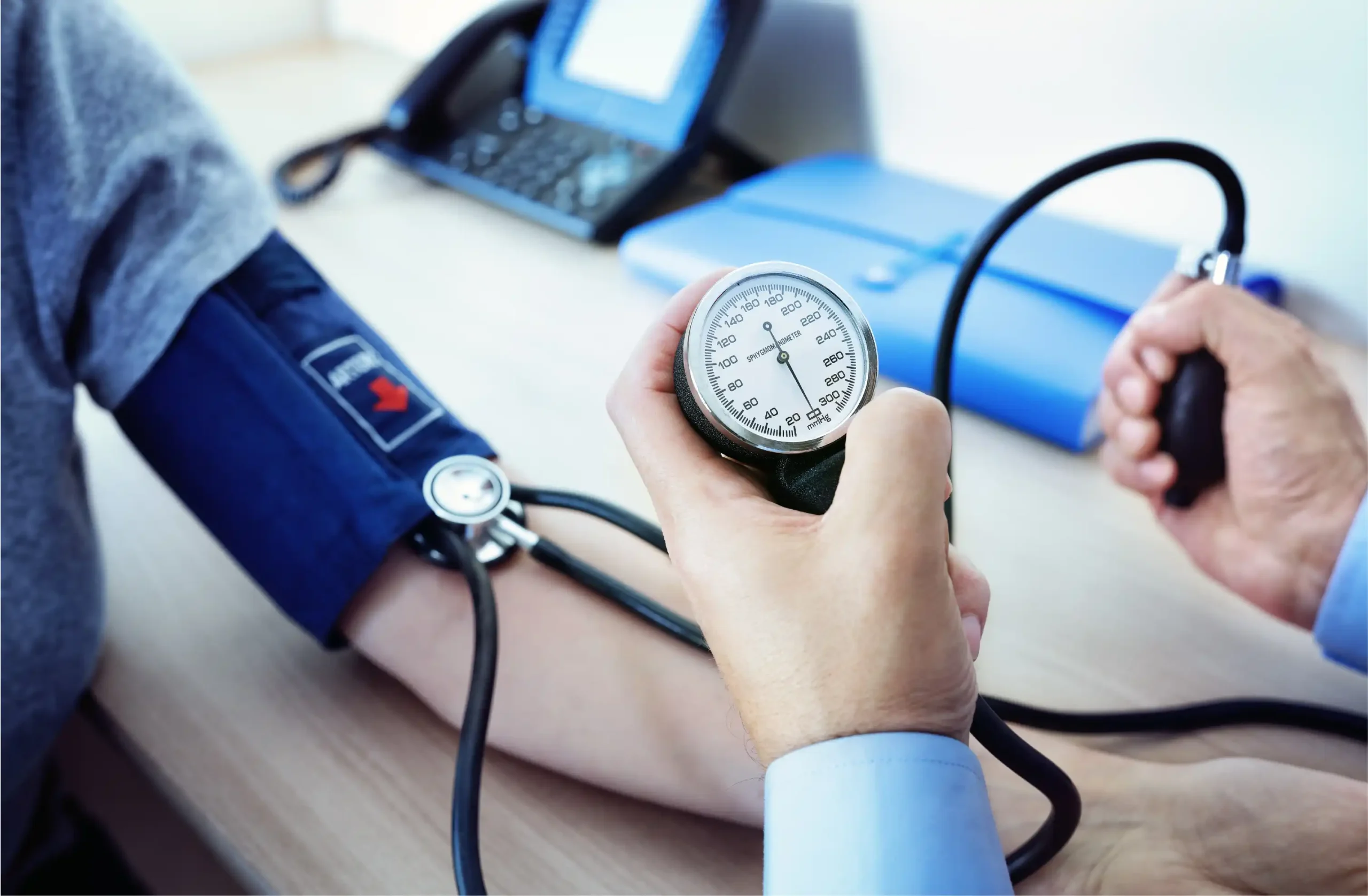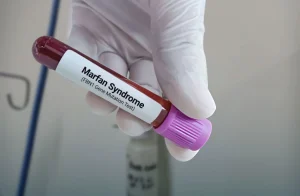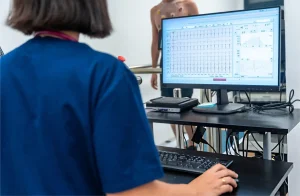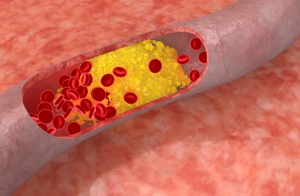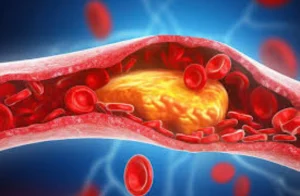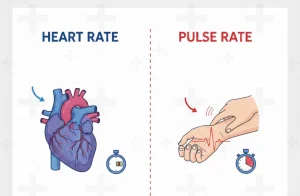Hypertension, commonly known as high blood pressure, is a pervasive health issue affecting approximately 1.13 billion people worldwide. This condition is often asymptomatic, earning it the moniker “silent killer,” yet it significantly elevates the risk of heart disease, stroke, and kidney failure.
In the United States, nearly half of adults—about 48.1% or 119.9 million individuals—are diagnosed with hypertension. Alarmingly, only about 1 in 4 adults with high blood pressure have their condition under control, underscoring the critical need for effective management strategies.
Given its widespread impact and the chronic nature of its progression, it’s imperative to understand whether hypertension is classified as a chronic disease. This classification has profound implications for treatment approaches, patient education, and healthcare policy. In this blog, we will explore hypertension from a cardiologist’s perspective, examining its characteristics, long-term health implications, and strategies for effective management.
What Is Chronic Hypertension?
Chronic hypertension refers to a condition where an individual consistently experiences elevated blood pressure over an extended period.
It is a long-term medical issue that develops gradually and often persists throughout life if not properly managed.
Unlike acute hypertension, which involves sudden and temporary spikes in blood pressure, chronic hypertension requires ongoing treatment and monitoring to prevent serious health complications.
Understanding Blood Pressure Basics
To understand chronic hypertension, it’s important to know what blood pressure means:
- Systolic pressure (top number): The pressure in the arteries when the heart contracts.
- Diastolic pressure (bottom number): The pressure in the arteries when the heart relaxes between beats.
Normal blood pressure is considered to be 120/80 mmHg. A consistent reading of 140/90 mmHg or higher on multiple occasions typically indicates hypertension.
Defining Chronic Hypertension
Chronic hypertension is characterized by:
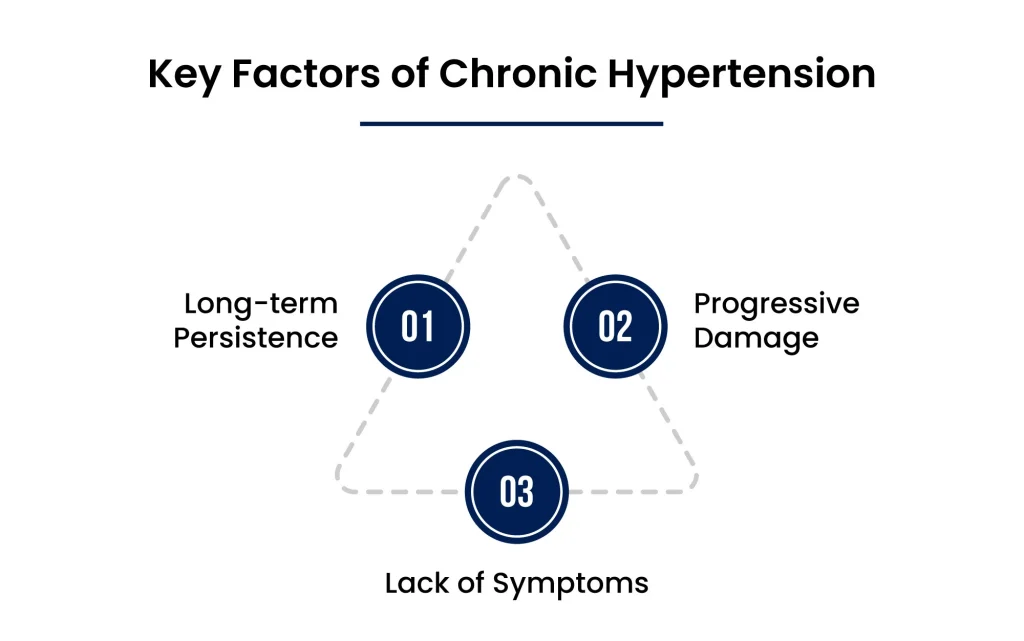
- Long-term Persistence: Blood pressure remains elevated for months or years.
- Lack of Symptoms: Often asymptomatic, earning it the name “silent killer.”
- Progressive Damage: Over time, high blood pressure damages vital organs such as the heart, brain, kidneys, and blood vessels.
Types of Chronic Hypertension
1- Primary (Essential) Hypertension:
This is the most common form, accounting for 90-95% of all hypertension cases.
It develops gradually without an identifiable cause, though factors like genetics, age, lifestyle, and diet play a significant role.
2- Secondary Hypertension:
Caused by an underlying medical condition, such as kidney disease, hormonal imbalances, or certain medications.
Treating the root cause can help reduce blood pressure.
Chronic Hypertension During Pregnancy
Chronic hypertension can also affect pregnant individuals. Unlike gestational hypertension, which develops during pregnancy, chronic hypertension is diagnosed when elevated blood pressure is present before pregnancy or within the first 20 weeks.
Proper management is critical to reduce risks for both the mother and the baby, such as preeclampsia, preterm birth, or low birth weight.
Is Hypertension a Chronic or Acute Disease?
Hypertension, or high blood pressure, is widely classified as a chronic disease due to its long-term, persistent nature and its gradual impact on the body.
However, there are acute phases of hypertension that require urgent medical attention, leading to some confusion about its classification.
To understand where hypertension fits, we must distinguish between chronic and acute conditions.
Chronic Disease vs. Acute Disease
- Chronic diseases are long-lasting, persistent medical conditions that progress over time. They require ongoing management and, in most cases, cannot be cured but can be controlled (e.g., diabetes, cardiovascular disease, and arthritis).
- Acute conditions, on the other hand, occur suddenly and are typically short-term. They often require immediate intervention but resolve within a short period with proper treatment (e.g., infections, injuries, or acute respiratory issues).
Hypertension as a Chronic Disease
Hypertension fits the chronic disease definition because:
Persistence: Hypertension develops over months or years, often without noticeable symptoms, earning it the nickname “the silent killer.” If left untreated, it persists throughout life.
Progression: Over time, unmanaged hypertension causes damage to vital organs like the heart, kidneys, and brain, leading to complications such as heart failure, stroke, and chronic kidney disease.
Lifelong Management: Most individuals diagnosed with hypertension require lifelong monitoring, medication, and lifestyle modifications to control blood pressure levels and reduce associated risks.
According to the World Health Organization (WHO), hypertension is one of the leading chronic health conditions globally, contributing significantly to premature mortality and disability. In fact, nearly 1 in 3 adults worldwide live with hypertension, yet many remain undiagnosed or inadequately treated.
Acute Phases of Hypertension
While hypertension is primarily chronic, there are acute phases that can occur:
Hypertensive Urgency: A sudden and severe rise in blood pressure (e.g., >180/120 mmHg) without immediate organ damage.
Hypertensive Emergency: A critically high blood pressure spike that causes acute organ damage, such as heart attack, stroke, or kidney failure. This is a medical emergency requiring immediate treatment.
These acute hypertensive episodes are usually complications of poorly managed chronic hypertension, highlighting the importance of consistent monitoring and treatment.
Prevent heart problems before they start – Schedule a preventive checkup
Contact UsHow Can You Manage Your Chronic Hypertension?
Managing chronic hypertension effectively is essential to reduce the risk of serious complications like heart disease, stroke, and kidney damage. While hypertension cannot always be cured, it can be well-controlled with a combination of lifestyle changes, medications, and consistent monitoring.
Adopt a Heart-Healthy Diet
Diet plays a significant role in controlling blood pressure. One of the most effective dietary plans is the DASH diet (Dietary Approaches to Stop Hypertension).
Key Principles:
- Increase fruits and vegetables.
- Consume whole grains, nuts, and lean proteins (e.g., fish, poultry).
- Limit sodium intake to less than 2,300 mg/day (about 1 teaspoon of salt). For better results, aim for 1,500 mg/day.
- Reduce saturated fats, red meat, and added sugars.
Tip: Opt for foods rich in potassium, such as bananas, avocados, and spinach, as potassium helps balance sodium levels.
Maintain a Healthy Weight
Excess weight increases blood pressure and places extra strain on the heart. Losing even a small amount of weight can significantly lower blood pressure.
Goal: Aim for a Body Mass Index (BMI) within the range of 18.5–24.9.
Tip: Losing 5-10% of your body weight can result in measurable improvements in blood pressure.
Engage in Regular Physical Activity
Physical activity helps strengthen the heart, improve blood circulation, and lower blood pressure naturally.
Recommendation:
- Aim for at least 150 minutes per week of moderate-intensity aerobic activity (e.g., brisk walking, cycling, swimming).
- Include muscle-strengthening exercises twice a week.
Tip: Start with small, manageable sessions (e.g., 10-15 minutes) and gradually build up.
Limit Sodium and Alcohol Intake
Sodium: Excess salt intake can raise blood pressure. Check food labels for “low-sodium” options. Avoid processed foods, canned goods, and restaurant meals, which are often high in salt.
Alcohol: Limit alcohol to no more than:
- 1 drink per day for women.
- 2 drinks per day for men.
Tip: Stay hydrated with water and reduce sugary or caffeinated beverages.
Quit Smoking and Avoid Tobacco Use
Smoking damages blood vessels and raises blood pressure. Quitting smoking has immediate and long-term benefits for blood pressure and heart health.
Tip: Seek support from smoking cessation programs, medications, or counseling.
Manage Stress Effectively
Chronic stress can contribute to elevated blood pressure. Managing stress through healthy techniques is essential:
- Try meditation, deep breathing exercises, or yoga.
- Prioritize tasks and take breaks when needed.
- Connect with family, friends, or professional counselors for emotional support.
Tip: Hobbies and regular physical activity can also help reduce stress levels.
Take Prescribed Medications Consistently
For many individuals with chronic hypertension, lifestyle changes alone may not be enough. Doctors may prescribe antihypertensive medications to control blood pressure effectively.
Common Medications Include:
- Diuretics (help eliminate excess sodium and water).
- ACE inhibitors (relax blood vessels).
- Beta-blockers (reduce heart rate and workload).
- Calcium channel blockers (prevent blood vessel tightening).
- Tip: Always follow your doctor’s instructions regarding medication use. Never skip doses or stop medications without medical advice.
Monitor Your Blood Pressure Regularly
Regular monitoring is key to managing chronic hypertension and ensuring treatment effectiveness.
- At Home: Use a reliable, calibrated blood pressure monitor.
- Frequency: Check your blood pressure at least once a week or as advised by your doctor.
- Track Results: Maintain a log to share with your healthcare provider
Regular Doctor Visits
Consistent follow-ups with your doctor are essential for:
- Monitoring your blood pressure trends.
- Adjusting medications if necessary.
- Identifying and managing potential complications early
Words By Author
Chronic hypertension is a silent yet persistent condition that, if left unmanaged, can lead to life-threatening complications such as heart disease, stroke, and kidney failure. By understanding its nature as a chronic disease and taking proactive steps—like adopting a heart-healthy lifestyle, staying physically active, and adhering to prescribed treatments—you can significantly reduce its impact on your health and enhance your quality of life.
As cardiologists, we emphasize the importance of early diagnosis, regular blood pressure monitoring, and comprehensive care to keep hypertension under control. If you or a loved one are living with high blood pressure, seeking professional guidance is essential for developing a personalized treatment plan.
At Atlantic Cardiovascular, we specialize in delivering expert care for individuals managing chronic hypertension and other cardiovascular conditions. Our team of dedicated cardiologists uses a patient-centered approach, combining cutting-edge treatments with compassionate care to support you on your journey to better heart health.
Schedule a consultation today to take the first step in managing your blood pressure and protecting your heart. Your health deserves the best care, and at Atlantic Cardiovascular, we are here to provide it.

